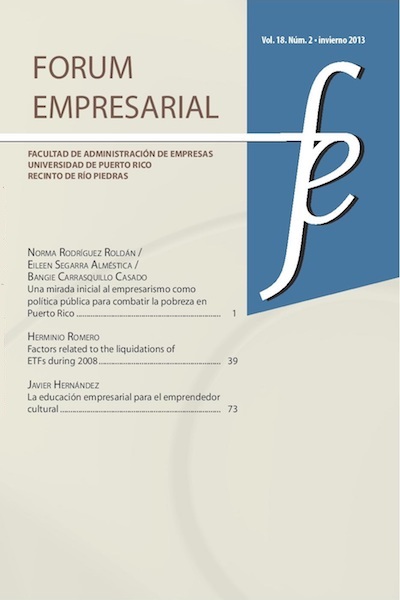Abstract
Beyond arts management as a new academic and professional field, there exist a necessity in identifying the interest and needs of cultural entrepreneurs in order for them to receive the necessary tools on business education. The cultural industries have a high level of self-employment; therefore, more artists need to develop effective skills that will increase their possibilities of success. Are they interested in this type of education? What type of skills do they want to develop? How would they like to receive them? Through a survey, the research presents the opinions of 165 artists in Puerto Rico regarding this topic, as well as their perception on the factors that should be considered when elaborating an educational offer.References
Asuaga, C., Lecueder, M. & Vigo, S. (2005). The performing arts and the cost general theory. MPRA Paper No. 13742, Munich.
Benhamau, F. (2003). Artists ́ labour markets. Handbook of cultural economics (pp. 69-75). Massachusetts, USA: Edward Edgar Publishing.
Brkic, A. (2009). Teaching arts management: Where did we lose the core ideas? The Journal of Arts Management, Law, and Society, 38(4), 270-280.
Caves, R. (2000). Creative industries: Contracts between arts and commerce. Cambridge, MA: Harvard Press.
Colbert, Fs. (2003). Entrepreneurship and leadership in marketing the arts. International Journal of Arts Management, 6(1), 30-39.
Ebewo, P. & Sirayi, M. (2009). The concept of arts/cultural management: A critical reflection. The Journal of Arts Management, Law, and Society, 38(4), 281-295.
Eikhof, D. & Haunchild, A. (2006). Lifestyle meets market: Bohemian entrepreneurs in creative industries. Creativity and Innovation Management, 15(3), 234-241.
Elmeier, A. (2003). Cultural entrepreneurialism: On the changing relationship between the arts, culture and employment. The International Journal of Cultural Policy, 9(1), 3-16.
Evrard, Y. & Colbert, F. (2000). Arts management: A new discipline entering the millennium? International Journal of Arts Management, 2(2), 4-13.
Finn, A., McFadyen, S. & Hoskins, C. (1994). Marketing, management, and competitive strategy in the cultural industries. Canadian Journal of Communication, 19(3). Recuperado de http://www.cjc-online.ca/index.php/journal/article/viewArti-cle/831/737
Garnham, N. (2005). From cultural to creative industries: An analysis of the implications of the "creative industries" approach to arts and media policy making in the United Kingdom. International Journal of Cultural Policy, 11(1), 15-29.
Hamilton, B. (2000). Does entrepreneurship pay? An empirical analysis of the returns to self-employment. Journal of Political Economy, 108(3), 604-631.
Hesmondhalgh, D. & Pratt, A. (2005). Cultural industries and cultural policy. International Journal of Cultural Policy, 11(1), 1-13.
Jusoh, R., Ziyae B., Asimiran, S. & Kadir, S. (2011). Entrepreneur training needs analysis: Implications on the entrepreneurial skills needed for successful entrepreneurs. International Business & Economics Research Journal,10(1), 143-148.
Martinell, A. (2009). Las interacciones en la profesionalización en gestión cultural. Cuadernos del CLAEH, 2(32), 97-115.
Menger, P-M. (1999). Artistic labor markets and careers. Annual Review Sociology, 25, 541-574.
Ministerio de Cultura de Colombia. (2005). Arte y aparte: Manual para el emprendimiento en artes e industrias creativas. Recuperado de http://emprendimientosculturales.com/docs/49-arte-y-parte.
National Endowment for the Arts. (2008). Artist in the workforce: 1990-2005. Research Report # 48. Washington, DC: NEA.
Neck, H. & Greene, P. (2011). Entrepreneurship education: known worlds and new frontiers. Journal of Small Business Management, 49(1), 55-70.
Papandrea, F. & Albon, R. (2004). A model of employment in the arts. Australia: Blackwell Publishing Ltd.
Royseng, S. (2008). Arts management and the autonomy of art. International Journal of Cultural Policy, 14(1), 37-48.
Sommer, D. (2006). Cultural agency in the Americas. Durham, US: Duke University Press.
Throsby, D. (2001). Economics and culture. Massachusetts: Cambridge University Press.
Throsby, D. (2008). The concentric circles model of the cultural industries. Cultural Trends, 17(3), 147-164.
Throsby, D. & Hollister, V. (2003). Don ́t give up your day job: An economic study of professional artists in Australia. Sydney:Australia Council for the Arts.
United Nations Conference on Trade and Development. (2010). Creative economy: 2010 report. Geneva:United Nations.
By submitting a contribution to consideration of the Editorial Board of Fórum Empresarial, the authors attest that it is an original, unpublished work, which has not been nor will be simultaneously submitted to another journal for consideration and publication; that they are responsible for the work carried out and the content of the article; and they have the corresponding copyrights.
The authors grant the right of first publication of their work to Fórum Empresarial, in any medium and physical and electronic format, including internet. Publication shall be subject to the Creative Commons Attribution-NonCommercial 4.0 International License, which allows third parties to share the work, provided that the author and Fórum Empresarial (as a first publication) are cited.
The journal allows authors to retain publishing rights without restrictions. Authors are able to enter into separate, additional arrangements for the non-exclusive distribution of the journal's published version of the work (e.g., post it to an institutional repository or publish it in a book), with an acknowledgment of its initial publication in Fórum Empresarial.

